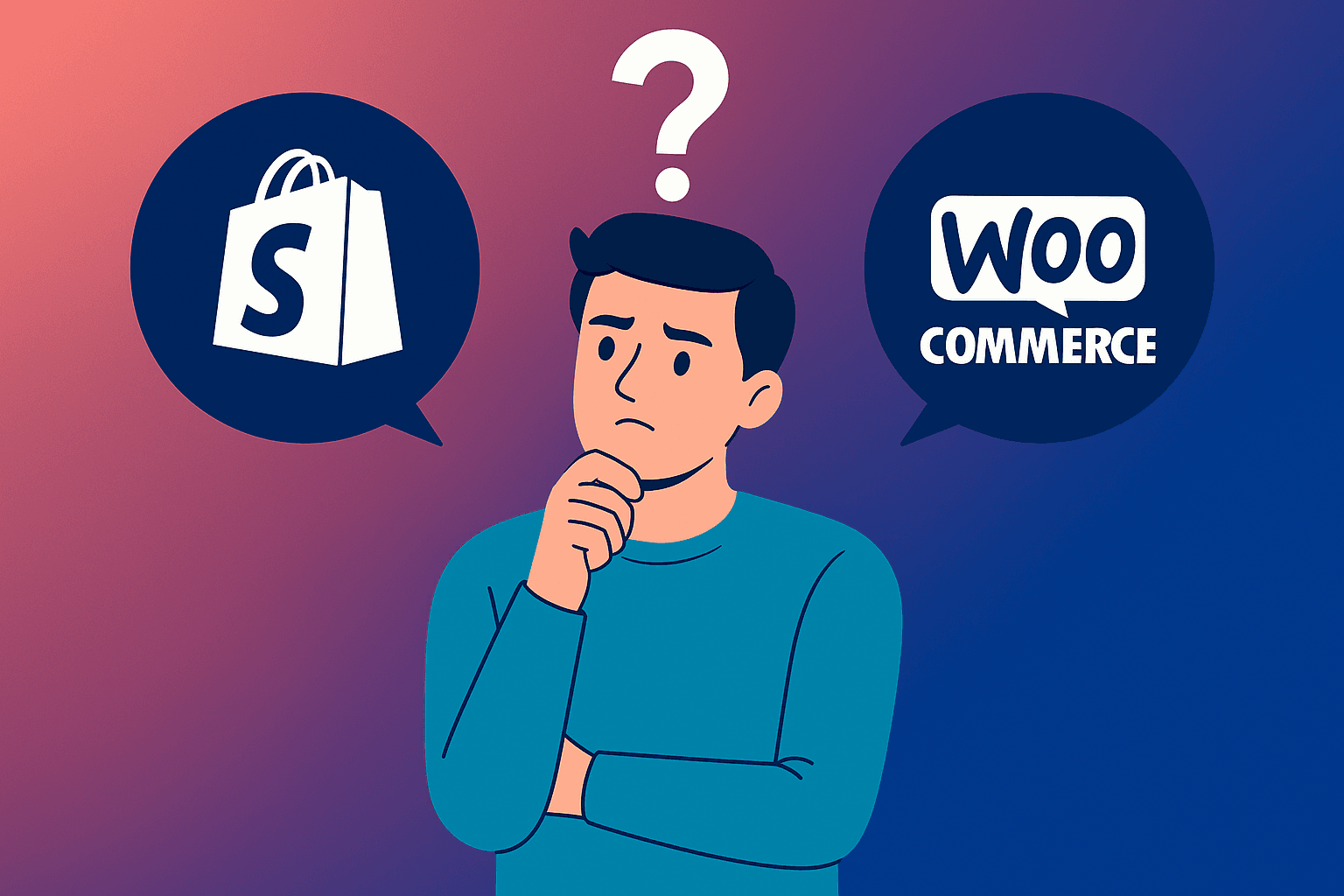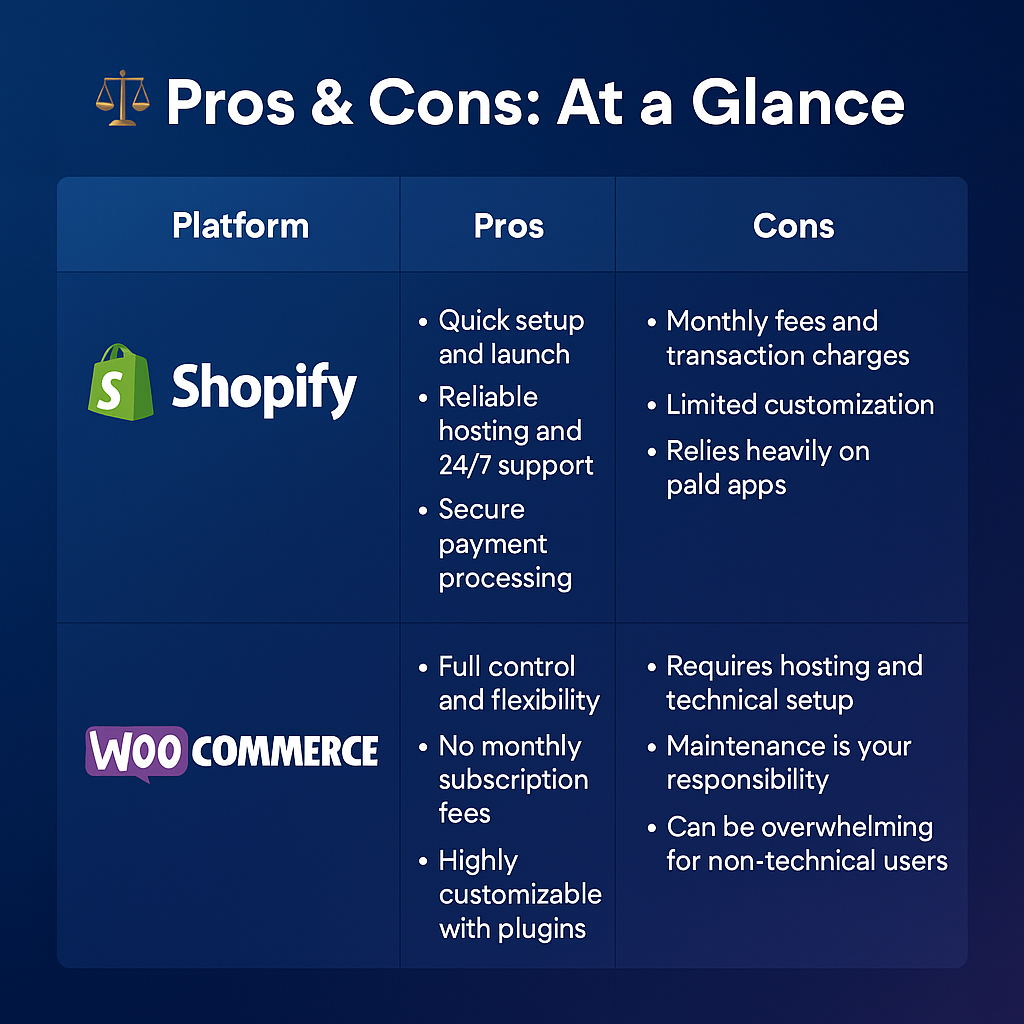-
WooCommerce gives you freedom and ownership, while Shopify offers simplicity and speed.
-
Choosing the right platform can make or break your eCommerce growth in 2025.
Shopify vs WooCommerce: Which Platform Is Right for You?

It’s 11:25 PM in Dhaka, and I’m staring at a blank laptop screen with a cold cup of Elite cha beside me.
My cousin Arif just texted:
“Bhai, I’m launching my leather bag business next week. Shopify or WooCommerce? Help!”
I laughed. Because same question, 30 plus times this year. Two months ago, I helped my university junior set up Shopify in 42 minutes flat, and he sold 7 bags on the first day.
Last week, I rebuilt my friend Rimi’s clothing store on WooCommerce.
She saved ৳38,000 in fees but spent 3 nights debugging a plugin. Both won. Both lost.
That’s the truth:
There’s no “best” platform. Only the right one for you.
And today, I’m not here to sell you a dream. I’m here to share the exact roadmap. I wish I had when I started in 2018, tested on 300+ hours of real stores in 2025, with fresh data, real screenshots, and two LinkedIn experts who’ve built 6-figure empires on each.
Let’s dive in, no fluff, just facts, stories, and a 1-minute quiz at the end to tell you exactly which one you should pick.
What Are Shopify and WooCommerce?
Shopify is like renting a serviced apartment: everything's taken care of (hosting, updates, security) and you just move in.
WooCommerce is like buying your own house: more work up-front (hosting, setup, plugins) but full control and flexibility.
Think of it like this: Shopify is like renting a fully serviced apartment. WooCommerce is like owning your own house. — Salik Ahmed (LinkedIn post)
Both can work. The key is deciding which level of control, cost, and scalability fits you.
| Type | Shopify | WooCommerce |
| Best For | All-in-one hosted platform (Beginners, fast scaling) | Free plugin for WordPress (Full control, SEO nerds) |
| 2025 Market Share | 29% (US), 1.7M+ stores | 39% globally, 6.2M+ sites |
| Setup Time | 30 mins | 2–6 hours |
Feature Comparison: Shopify vs WooCommerce
Here’s a simplified breakdown:
| Feature | Shopify | WooCommerce |
| Ease of Use | Very simple setup | Requires more setup |
| Flexibility/Control | Moderate | High |
| Hosting | Included (you don’t manage it) | You pick & manage hosting |
| Cost Structure | Monthly fees + transaction fees | Plugin is free; hosting + extras vary |
| SEO & Content | Good out-of-the-box | Excellent if optimized well |
| Scalability | Great for SMBs | Ideal for growing/mature businesses |
Overall, Shopify has less complexity, and WooCommerce has more power.
Comparison by Pricing
Let’s break it down in real terms:
- Shopify’s monthly fee is predictable, but add-ons and transaction fees can stack up.
- WooCommerce itself is free, but you’ll pay for hosting, domain, SSL, plugins. And those costs can be lower if you pick smart.
According to, Tracy Wisnowski
Many people overlook the hidden costs of Shopify, while WooCommerce offers long-term control, flexibility, and ownership.
For example, Sarah started on Shopify Basic at $29/month. After a year, apps and transaction fees added up to $600. When she switched to WooCommerce + good hosting, her costs stabilized, and she got better performance.
Design & Customization: Control vs Convenience
- Shopify: 800+ themes (24 free). You can tweak with Liquid, but you’re in a sandbox. → 2025 Update: AI Theme Generator — type “minimal leather bags”, get 3 designs in 10 sec. Cool, but limited.
- WooCommerce: Infinite freedom. I turned Rimi’s site into a Pinterest-style grid with custom filters: color, size, occasion. Took 4 hours. Worth it.
If your brand needs a unique look and advanced integrations (e.g., subscription models, multi-vendor marketplaces), WooCommerce offers the flexibility to fully tailor the experience.
Pro Tip: Use Elementor + Crocoblock for Woo, drag and drop like Shopify, but 100% yours.
It’s your turn. Who is the winner?
SEO & Marketing
If speed and discoverability matter:
- WooCommerce, when optimized (good hosting, caching, CDN), can outperform.
- Shopify handles infrastructure for you, but you have less fine-control for SEO and custom performance tweaks.
Example: Sarah’s store (on Shopify) faced slow page loads during a marketing campaign. On WooCommerce with upgraded hosting, she shaved 1.5 seconds off load time—and conversion rates improved by ~12%.
According to, Sarah Rahman, SEO Lead @ 10Web (LinkedIn)
“SEO is a marathon. Shopify gives you running shoes and WooCommerce lets you build the track.”
Security & Support
- Shopify: 24/7 official support, large app store community.
- WooCommerce: Massive WordPress ecosystem, countless plugins, and developer resources.
If you value flexibility and want to integrate niche tools (CRM, ERP, custom analytics), WooCommerce gives you more options. If you want “plug-and-play” with minimal maintenance, Shopify might fit better.
Pros & Cons: At a Glance

Which One Should You Choose? Let's play 1-Minute Quiz
Answer YES/NO:
- Do you want to launch in under 7 days? → Shopify
- Is your budget under ৳2,000/mo? → WooCommerce
- Do you need custom filters (size, color, occasion)? → WooCommerce
- Will you sell >৳50L/year? → Shopify
- Are you scared of plugins/hosting? → Shopify
3+ YES to Shopify? → Go with Shopify.
3+ YES to WooCommerce? → Go with WooCommerce.
Before You Choose
Picking between Shopify and WooCommerce isn’t about chasing the perfect platform. It’s about choosing the path that fits how you want to grow. Your goals, your budget, your timeline, your comfort level with tech. Everything depends on you.
Whichever direction you take, make sure you have the right partner beside you. Someone who understands what real growth looks like and knows how to build a store that can handle the long game.
At Mediusware, we build high-performing online stores with WooCommerce when you need freedom and customization, and we support Shopify when you want speed and simplicity. If you’re exploring your options and want a store that scales with you, we can help bring that idea to life.
Let’s make your vision real.
